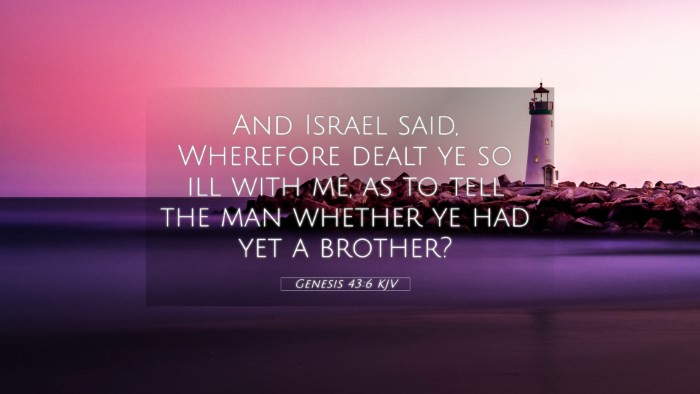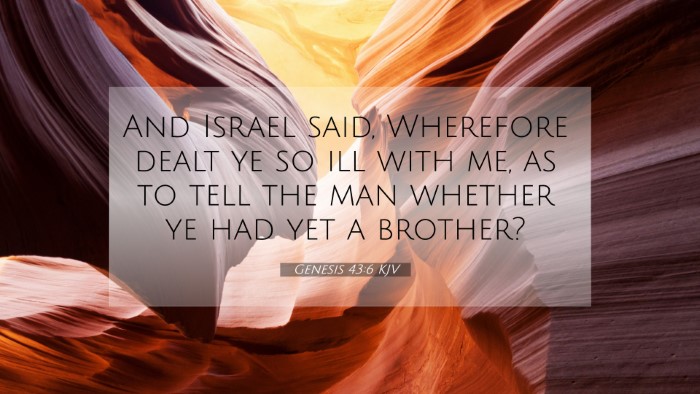Understanding Genesis 43:6
Genesis 43:6 is a key verse in the narrative of Joseph and his brothers during their time in Egypt. In this passage,
the dialogue reveals deep-seated family dynamics as well as the brothers' fears and concerns stemming from
their earlier actions towards Joseph. The verse reads:
"And Israel said, 'Why did you treat me so badly by telling the man you had another brother?'"
Summary of Genesis 43:6 Meaning
The verse highlights Jacob's distress and confusion regarding the situation with his sons and the mysterious
Egyptian ruler, who is later revealed to be Joseph.
Jacob's manipulation by his sons regarding the revelation of Benjamin underscores themes of trust and family loyalty.
Insights from Public Domain Commentaries
-
Matthew Henry:
Henry emphasizes Jacob's emotional state, pointing out the pain caused by the lack of communication
among the brothers. His questions reflect a blend of hurt and concern for his family, highlighting
the tension that arises from secrecy and miscommunication.
-
Albert Barnes:
Barnes notes Jacob's protective nature towards Benjamin, framing the situation as one where Jacob
feels betrayed because his sons did not share crucial information. This fear drives the narrative forward
as Jacob grapples with the potential loss of another son.
-
Adam Clarke:
Clarke elaborates on the psychological implications of the brothers' actions. He addresses how Jacob's
concern is compounded by the previous loss of Joseph, and how his overprotectiveness could further
complicate their situation in Egypt.
Bible Verse Cross-References
Several verses relate to Genesis 43:6, offering deeper insight into its themes. Here are some important cross-references:
- Genesis 37:30: "And he returned unto his brethren, and said, The child is not; and I, whither shall I go?" - Reflecting Jacob's earlier grief.
- Genesis 42:36: "And Jacob their father said unto them, Me have ye bereaved of my children..." - Connection to Jacob's sorrow over loss.
- Genesis 44:20: "And we said unto my lord, We have a father, an old man..." - This reveals the brothers' awareness of Jacob's vulnerability.
- Genesis 43:8: "And Judah said unto Israel his father, Send the lad with me..." - Judah's role as a mediator showcases brotherly responsibility.
- Genesis 45:3: "And Joseph said unto his brethren, I am Joseph; doth my father yet live?" - Parallel to Jacob's concern for family.
- Genesis 46:30: "And Israel said unto Joseph, Now let me die, since I have seen thy face..." - Reflecting familial reunification.
- Deuteronomy 5:16: "Honour thy father and thy mother, as the LORD thy God hath commanded thee..." - Themes of family honor and respect.
Connections to Thematic Elements
The themes of brotherhood, jealousy, and family loyalty that permeate Genesis are evident in the interactions
described in Genesis 43:6. This moment serves as a pivotal point for the brothers to confront their past and
seek reconciliation.
Inter-Biblical Dialogue
This verse echoes through many other scriptural narratives, notably when considering how family dynamics impact
larger redemptive themes throughout the Bible. For example, the protective nature between siblings can be seen
in the stories of Cain and Abel (Genesis 4) or in the relationship between David and his sons (2 Samuel 13).
Tools for Bible Cross-Referencing
Utilizing tools such as a Bible concordance or a Bible cross-reference guide
can significantly enhance your understanding of Genesis 43:6 and its implications within the broader
biblical narrative. These resources help identify connections between Bible verses, allow for thematic Bible verse
connections, and contribute to a deeper appreciation of scriptural interrelations.
Conclusion
In summary, Genesis 43:6 serves as a window into the complexities of Jacob's familial relationships, his
protective instincts, and the unfolding drama between Joseph and his brothers. By examining this verse through the lens
of public domain commentaries and connecting it with other relevant scriptures, one can observe the rich tapestry of
Biblical narratives interconnected through themes of love, regret, and reconciliation.


